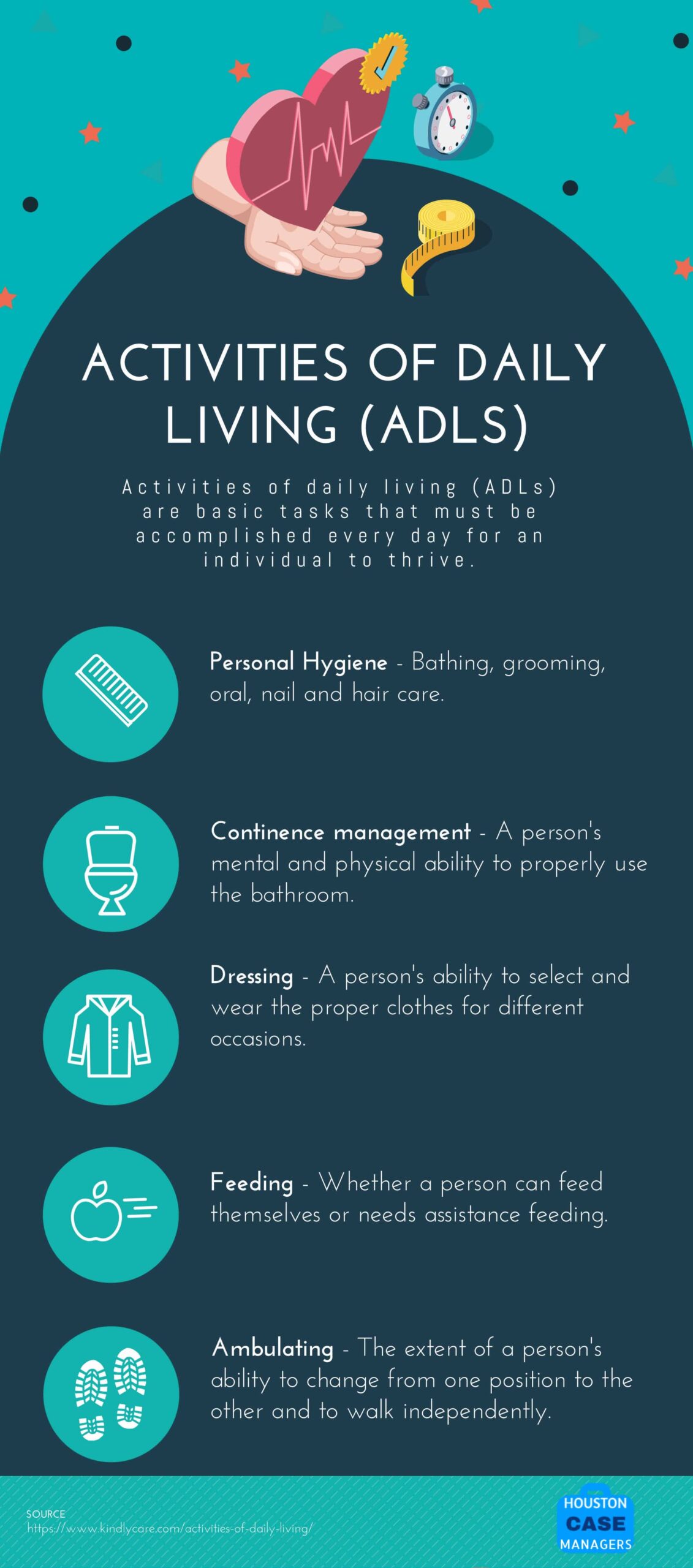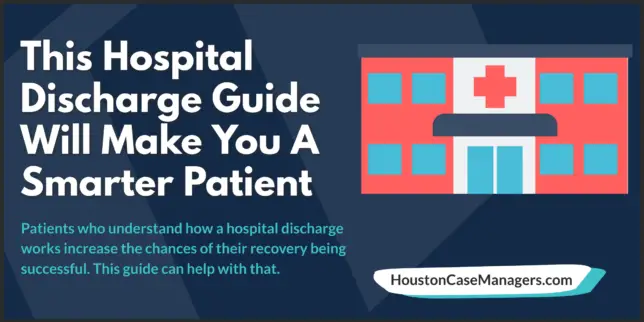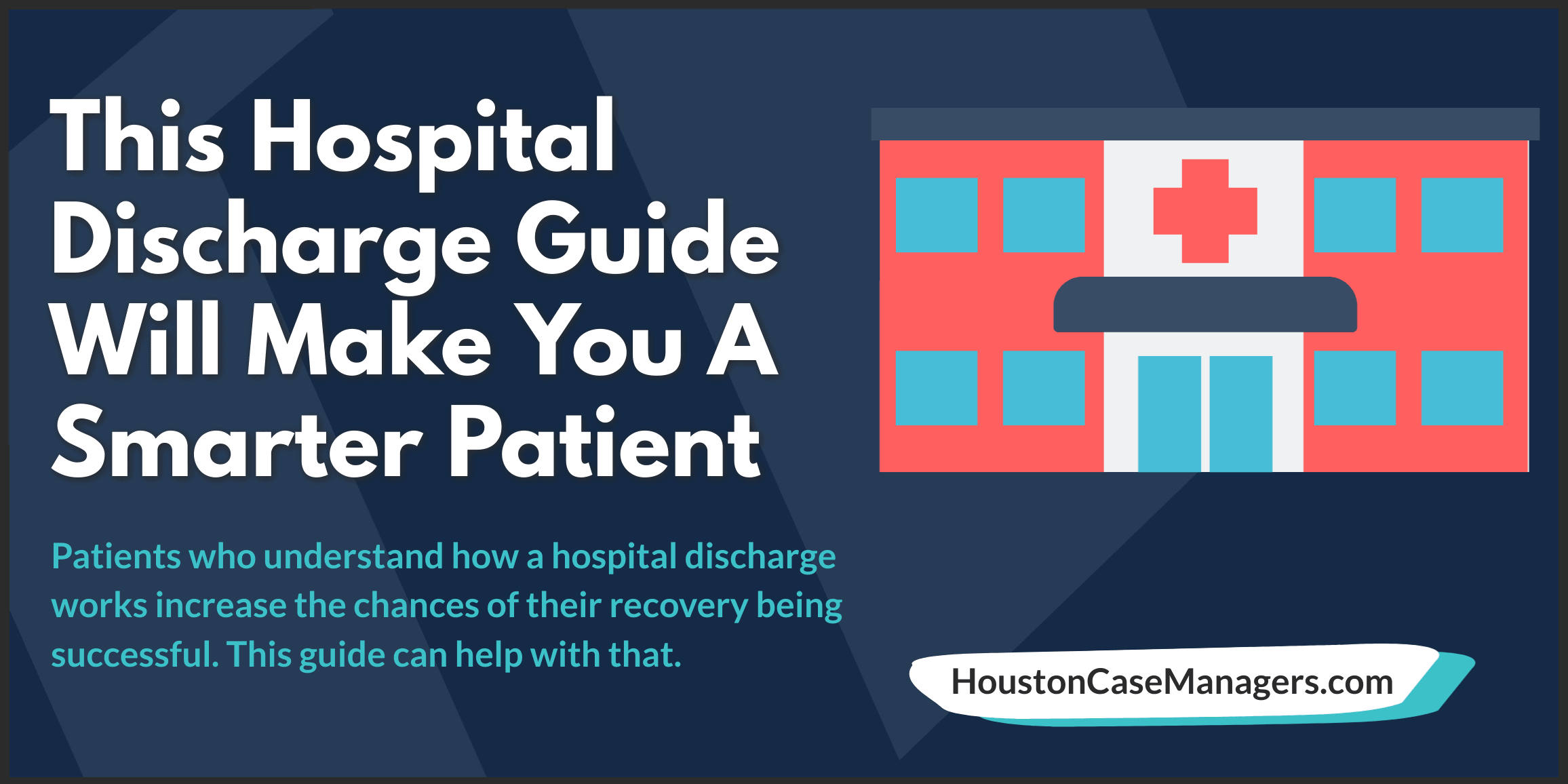This Hospital Discharge Guide Will Make You A Smarter Patient
In this guide, you will learn about how hospital discharges work.
Taking the time to learn the basics of the discharge process will make you a smarter patient which will lead to a better understanding, and help you to recover faster once you leave the hospital.
I’m Nick Bryant, founder of HoustonCaseManagers.com, where we create easy to understand guides to help you quickly connect clients to community resources.
Today I’m going to go over a number of topics related to hospital discharge which include: (use these links to be taken directly to this section of the article)
- What is hospital discharge?
- Why hospitals discharge patients?
- Who determines when you are discharged?
- Can you be discharged even if you have not fully recovered?
- What are the steps of discharge planning?
- 5 questions to ask your discharge planner
- Staff members who play a role in your discharge
- 3 places you could be discharged to after your hospital visit
- Risks of hospital discharge
- What is a discharge assessment?
- How to prepare for your discharge
There is a lot to cover, so let’s dive in!
What Is Hospital Discharge?
Hospital discharge is the process you go through when you leave the hospital after treatment.
A hospital discharge requires lots of planning by a team of doctors, nurses, and social workers to ensure that you are given the best chance of recovering outside of the hospital.
Why Do Hospitals Discharge Patients?
There are a number of reasons, but typically patients are discharged from the hospital when they no longer need inpatient care.
Most hospitals conduct a discharge assessment to determine whether you need more care after you leave the hospital. This discharge assessment determines whether you will need a minimal or complex discharge.
It is called minimal discharge when the assessment shows you need little or no care.
If you require more specialized care after departing from the hospital, it is referred to as a complex discharge.
Who Determines When You Are Discharged From The Hospital?
Ideally, only a doctor can authorize a patient’s release from the hospital, but the actual process of discharge planning can be completed by a nurse, social worker, or case manager.
The timing of a hospital discharge impacts the patient’s medical outcome as it sets the atmosphere for the patient as they move from an acute care environment to a skilled nursing facility, community-based care, or long-term care.
Regardless of where you are going after a discharge from the hospital, you need to closely follow the instructions provided by your healthcare providers.
Can You Be Discharged From The Hospital If You Have Not Fully Recovered?
Yes, in some cases, a hospital will release you whether or not you have fully recovered. This means that you will still require attention and care to make a full recovery.
Essentially, patients who get remain in the hospital require a higher level of care. In contrast, a person who is getting better does not need as long a hospital stay.
Additionally, a hospital environment predisposes you to several other infections especially if you have a weak immune system. For this reason, you wouldn’t want to stay long.
The cost of treatment is another reason you could be discharged before you fully recover. Like other institutions, staying in the hospital comes with a cost. The longer you stay the more costly it becomes for you and potentially the hospital.
What Is Hospital Discharge Planning?
Discharge planning is the coordination of medical services and setting of appointments to ensure that you have the best chance of recovering once you leave the hospital.
An effective discharge plan can help to decrease the chances of you being readmitted to the hospital.
A well-planned discharge plan would result in:
- Proper adherence to medications.
- Schedule the correct type of therapy sessions.
- Ensure that you have support from family or friends to help carry out your treatment plan once you leave the hospital.
Hospitals employ staff members called discharge planners to help you coordinate the tasks mentioned above.
How Discharge Planning Works
Discharge planning in a hospital typically works in 4 steps, which are:
- Evaluation
- Discussion
- Preparation
- Implementation
Here are more details about each step.
Step #1. Evaluation
The purpose of the evaluation is for the hospital to take a look at the patient’s needs and determine the level of care that is needed.
After an evaluation, hospital staff will have a better understanding of the potential outpatient services that will be needed and learn about family members who may be able to assist the patient during their recovery.
Step #2. Discussion
During this phase of discharge planning, the hospital staff will speak with you about your specific discharge plan. This includes topics like:
- What type of care is needed?
- Who will provide the care?
- Where you will be discharged to (home, skilled nursing facility, etc)
- List of medications to be taken, the frequencies, and dosages
Step #3. Preparation
At this stage, your hospital staff is planning your discharge.
This could involve ordering medical equipment, transferring you from a hospital to a skilled nursing facility, connecting you to home health care services, or providing caregiver training to a family member. The specific plan will depend on your individual needs.
Step #4. Implementation
Now that you’ve discussed your needs, and made preparations it’s time to carry out all of those discharge plans.
Understanding your discharge plan is important because once you leave the hospital the responsibility will be passed to you in regards to coordinating with health care providers, insurance companies, and medical equipment suppliers. If you have questions about your discharge plan this is the point when you should ask.
Questions That You Should Ask Your Discharge Planner
If you are unsure about what questions you should be asking, below you will find a list of some things that you can ask your discharge planner:
- What date will I be discharged?
- What type of care is needed once I am discharged? Skilled nursing? Home healthcare?
- What discharge plan is recommended by my hospital doctor?
- Do you have a list of providers For aftercare? This can include home health agencies or caregiver providers.
- Can you bathe and groom yourself? These are considered activities of daily living, and your discharge planner may be able to help you obtain a caregiver to help with these tasks.
Hospital Discharge Planning Staff Members
Discharge planning requires a joint effort from a number of staff members at the hospital. The list below will tell you about each staff member and what their role is in your hospital discharge.
Hospital Doctor
Your doctor is responsible for looking over your discharge plan and signing off on it.
Their responsibility is to anticipate any risks, ensure that the right medications have been prescribed, and see to it that all your medical needs are met prior to you being discharged.
Nurses
The hospital nurse is probably the staff member that knows you best in the hospital.
They have likely been with you throughout your admission and now during your discharge. If you have medical questions during your discharge the nurse that you have been working with can probably answer these.
In some hospitals, the nurse also act as your case manager.
Case managers
Your hospital case manager helps you to coordinate with doctors, therapists, and other staff members.
Case management staff will develop your care plan, assist you with navigating inpatient settings, and help you understand your discharge plan.
Social Worker
Social workers can help you connect to community resources and explore the medical or government benefits that you may qualify for.
Discharge planners
A discharge planner is a staff member who helps you to connect to the medical resources and schedule follow-up appointments that you will need to recover outside of the hospital.
Discharge planners may be licensed as either a nurse or even a social worker.
If you have questions about services covered by your insurance or the types of medical equipment you can receive, your discharge planner will be able to help you.
Occupational Therapist
An occupational therapist can help you to recover and maintain the skills that are needed for activities of daily living.
Occupational therapists typically work with seniors who are recovering from physical or cognitive issues. They also help individuals of all ages who have disabilities to resume common activities of daily living.

Physical Therapist
A physical therapist’s primary function is to work with you to help you regaining mobility and reduce pain. They can do this in either a clinical rehab setting or inside your home.
Speech therapist
Speech therapists work with individuals who have suffered from a stroke or some type of neurological condition that has resulted in communication problems.
Home Caregivers
Not to be confused with home health nurses, a caregiver will help you with daily living activities.
This can include things like bathing, grooming, and meal preparation.
Something to note is that Medicare does not cover this service. To receive help paying for a home caregiver you will have to have Medicaid, pay out of pocket, or receive VA benefits.
Home Health Nurse
When you qualify for home health you are essentially receiving nurse visits. These workers do not typically help with grooming, however, they can help with things like:
- Measuring vital signs
- Administer medications
- Re-dress wounds
- Help you to create a treatment plan
Unlike home caregivers, home health is covered by Medicare.
3 Settings That You Can Discharge To From The Hospital
As the patient, you have a say in where you are ultimately discharged.
Most people would prefer to be discharged to their home although in some cases this is not the safest option. If your discharge planner feels that there is a safer option they will talk to you about this alternative and explain why they feel it is a safer choice.
In this section, we will go over the different places that you can be discharged to after your hospital stay.
Skilled Nursing Facility
If your illness requires you to receive treatment in the hospital setting you may be discharged to a skilled nursing facility (SNF). These facilities are staffed by nurses, doctors, and case managers who can help you to recover from Illness.
Typical services offered here are things like physical therapy, occupational therapy, speech therapy, medication management, and assistance in obtaining medical equipment.
Outpatient Rehab
If your discharge plan does not require inpatient services it is possible that you can complete your rehab in an outpatient clinic.
Like skilled nursing facilities, rehab centers also offer physical, occupational, or speech therapy. Again to be eligible to receive outpatient rehab services your illness must not be acute.
Recover At Home
Lastly, patients have the option of recovering at home as long as this is supported by the discharge plan.
Patients who are discharged home should have good support from family and friends who can help them attend follow-up appointments and coordinate home visits from nurses and home care providers.
Hospital Discharge Assessment
A hospital discharge assessment answers questions regarding treatment and care when you return home, who will be in charge of your care, how they can be reached, and when/how often you need care.
Additionally, the hospital discharge assessment should include the following:
- Preparation for you to leave the hospital including things such as making sure you can get home, you have the equipment and medication needed, etc.
- The kind of care you will receive when you leave the hospital. Whether it is temporary care or on-going care.
- Steps you should take if you are unhappy with your hospital discharge.
- When and how you should expect the test results.
- The types of exercises you will require, how, and when you should do them
- Your expectations in regards to your new facility if you are not going home.
What Are The Risks Of A Hospital Discharge?
There are several threats to a safe discharge that exist and some fall around the time of discharge. Such factors include:
- Cognitive impairment
- Infections, especially urinary tract infections (UTI)
- Understanding the dosage and frequency of medications prescribed
- The patient is unable to properly use medical equipment
- Lack of support from caregivers.
- A hospital discharges a patient before you are medically ready for a hospital discharge
When risks like these are not accounted for, the likelihood of you returning to the hospital increases.
Preparing For Your Hospital Discharge
Getting ready to discharge from the hospital essentially involves understanding your discharge plan, involving supportive family members in the process, knowing which doctors you will follow up with, and coordinating with medical providers.
Below is a list of additional tips to help you better prepare for your hospital discharge.
- Make sure to ask for a paper or a pencil so that you can make a list of all your questions.
- Take notes whenever necessary.
- Before the discharge process begins, make sure to have all your questions regarding the same answer in a language that you understand well.
- Ensure whatever explanation you receive is in a plain language that you will not struggle to make out.
- Do not hesitate to ask for printed information about your discharge.
- If possible, ask one of your relatives to be present while you go through the discharge process.
Conclusion
Hospital discharges can be confusing and stressful due to all of the staff members involved and coordination of services.
The best advice that I can offer is to simply ask questions before you leave the hospital if you are unsure about something.
Your discharge planner and the hospital want you to recover.
The reason being is hospitals lose money when you quickly readmit for the same medical condition. Because of this, your hospital staff wants to make sure you are set up to succeed so again ask questions!
Finally, if your discharge plan becomes too overwhelming you can always have a family member visit the hospital or listen in on any calls with your doctor. Many patients do this and hospital staff members are 100% ok with this.
Similar Articles That May Interest You:
- Where To Find Free Medical Equipment In Houston
- 20 Places To Find Prescription Assistance In Houston
- Medicaid Retroactive Coverage: Assistance Paying For Hospital Bills Dating Back 3 Months
- Ultimate Guide To Cheap Medical Transportation In Houston
- Ultimate Guide To Finding Speech and Physical Therapy In Houston
Nick Bryant is the author of Understanding Healthcare Is Half The Battle and a Senior Counselor with 13+ years of experience working in community health and mental health. He enjoys spending time with his family, watching WWE on Friday nights, and working toward a Google Data Analytics certification. If you have additional questions about community resources or government assistance programs, simply leave a comment below and he will follow up as soon as possible.



